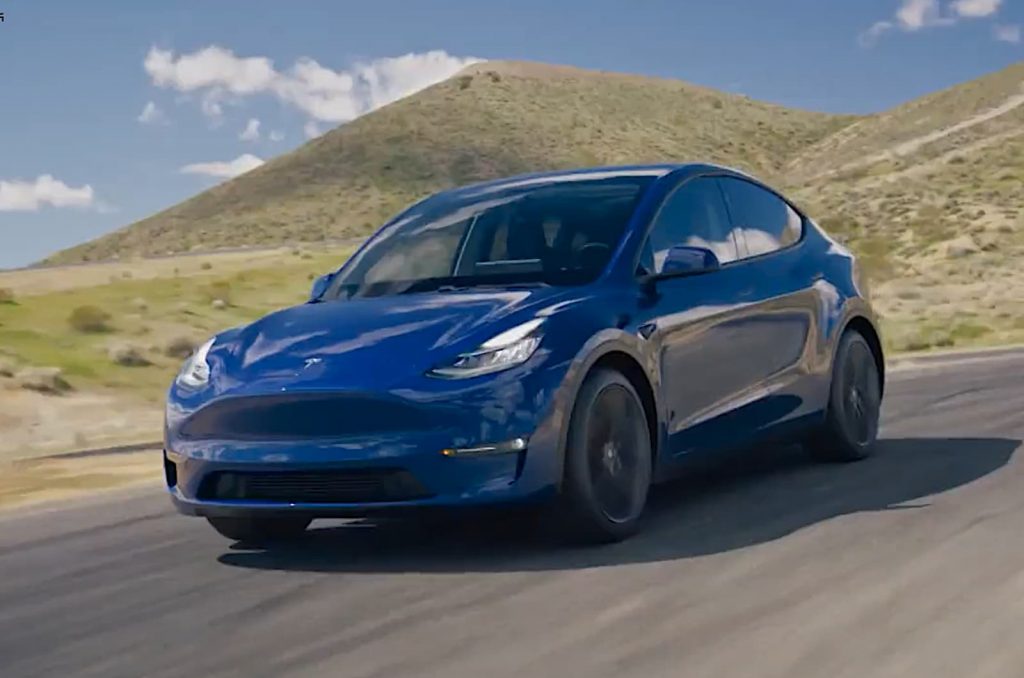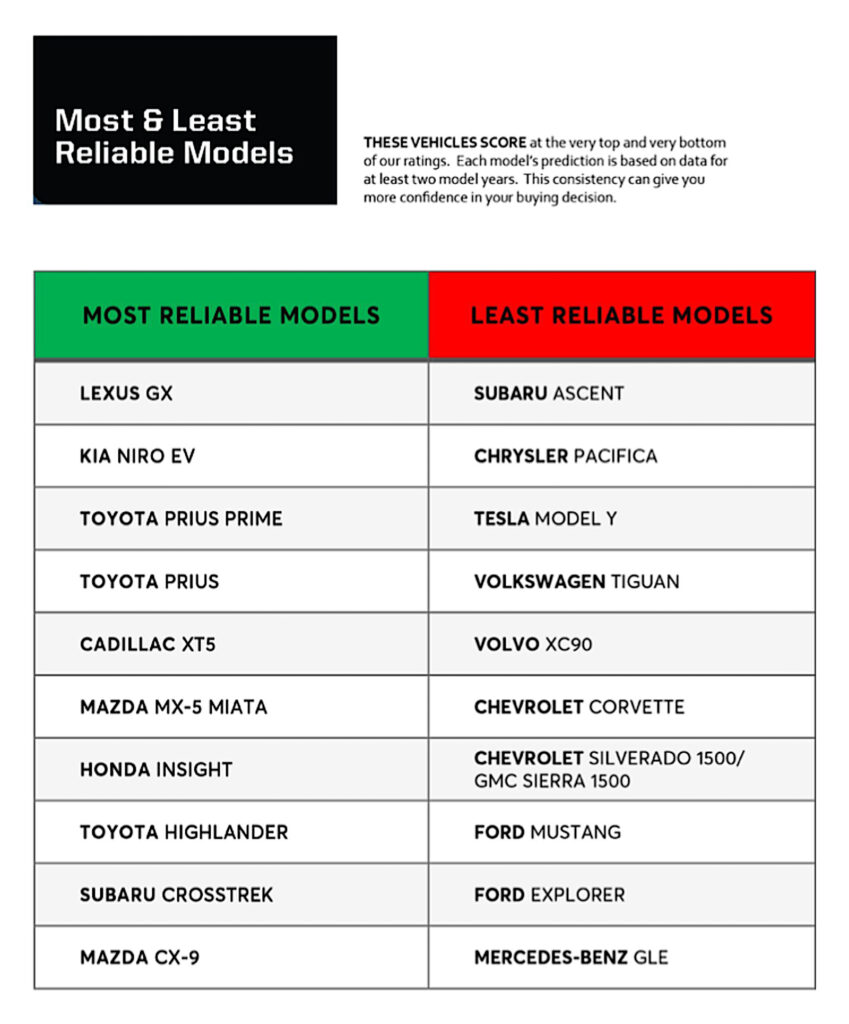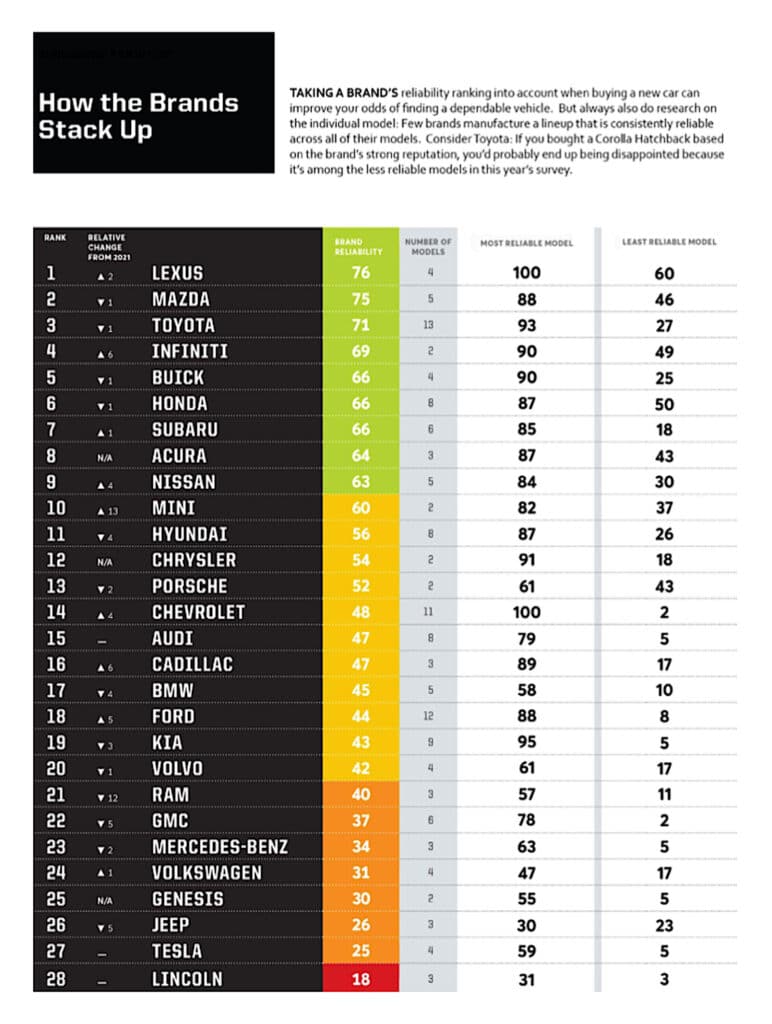Japanese automakers — again — dominated the Annual Auto Reliability study from Consumer Reports, but there was some good news for Detroit manufacturers in the latest survey of vehicle owners.

The study found Lexus, Mazda and Toyota suffering the fewest reliability issues, with eight Japanese brands in the top 10. Only Buick made that cut among domestics, while Mini was the sole European. But Detroit brands scored extremely well in some key product segments, including compact SUVs and all pickup categories.
The closely watched report had mixed news, meanwhile, on the “electrified” vehicle front. It revealed that hybrids and plug-in hybrids are among the most reliable vehicles on the market. But pure battery-electric vehicles, especially those built by Tesla, suffered from a number of serious problems.
Problems for electric vehicles
When it comes to the models that scored best in the Auto Reliability study, “We’ve seen this trend before,” said Jake Fisher, the senior director of automotive testing for Consumer Reports. “And for the same reason. (The Japanese) are more conservative in rolling out new technology. Toyota and Lexus, in particular, tend to be the last ones with things like Apple CarPlay, and that has served them well.”
The Lexus GX SUV was the most reliable model of all those covered by this year’s study, noted Fisher, and it also is one of the oldest products now available, meaning the Japanese brand has had time to work out any kinks.

Technology, it seems, is a double-edged sword when it comes to consumer demand and product reliability. Automakers say that customers want more high-tech features, but those same features also tend to break more the CR study shows.
That’s in line with what other research, such as the J.D. Power Initial Quality Study which found features like CarPlay, in-car navigation and voice controls responsible for the major of reported problems.
To varying degrees, the push for technology has impacted all manufacturers and all model categories. And it’s not just digital devices. South Korean carmakers Hyundai and Kia came in mid-pack in the latest Auto Reliability study and Fisher pointed to problems they’re both having with their newest transmissions.
Digital technology still a bugaboo
But digital tech is proving to be a real Achilles Heel for the industry. And it helps explain why BEVs scored so poorly, on the whole in the latest study.
“It’s not their (all-electric) powertrains,” said Fisher. “Because of the way many EVs are marketed, they are loaded up with everything. Even their door handles and climate control systems are being reinvented as they go after early adopters. And that’s where they are having problems.”
More basic BEVs, like the Hyundai Kona EV, actually did quite well in the annual owner survey. And the Kia Niro EV was the second most-reliable vehicle in the entire report, behind only the Lexus GX. Another battery-electric model also got favorable responses: the Ford Mustang Mach-E.

Then there’s Tesla. The automaker continues to have major quality issues, both with its technology and the sort of traditional mechanical issues that few other automakers today suffer from. The “below average” Model Y SUV had issues with things as far afield as faulty climate control, bad paint and leaks. The rest of the Tesla line-up, according to Consumer Reports, also fared poorly.
Curiously, while all-electric vehicles fared worse than average, on the whole, the “very most reliable category” covered hybrids and plug-in hybrids, stressed Fisher. He noted that this comes as something of a surprise considering the complexity of their gas/electric drivetrains. But they also tend to have fewer high-tech features that can go wrong, at least compared to the latest all-electric vehicles.
Detroit’s silver lining
Though Japanese manufacturers dominated the latest Annual Auto Reliability study, the data actually provided some good news for Detroit. Domestic manufacturers have been pulling out of low-demand segments, such as compact cars. But they are rapidly addressing problems with vehicles in the segments they focus on.
The Bronco Sport, for example, beat out the Toyota RAV4, the traditional stalwart in the Compact SUV segment. Domestics dominated in seven growing categories, including midsize and full-size pickups, overall.
As for European brands, they were mid-pack, with the exception of 10th-ranked Mini. That reflects, in part, their heavy focus on advanced technologies. Mercedes-Benz and Volkswagen were two of the lowest-ranked brands in this year’s study.
Lincoln was the anchor dragging down the overall industry, scoring slightly worse than Tesla which was 27th among the 28 brands Consumer Reports included in this year’s study.








How is Acura rated so high yet has no CR recommended vehicles today?